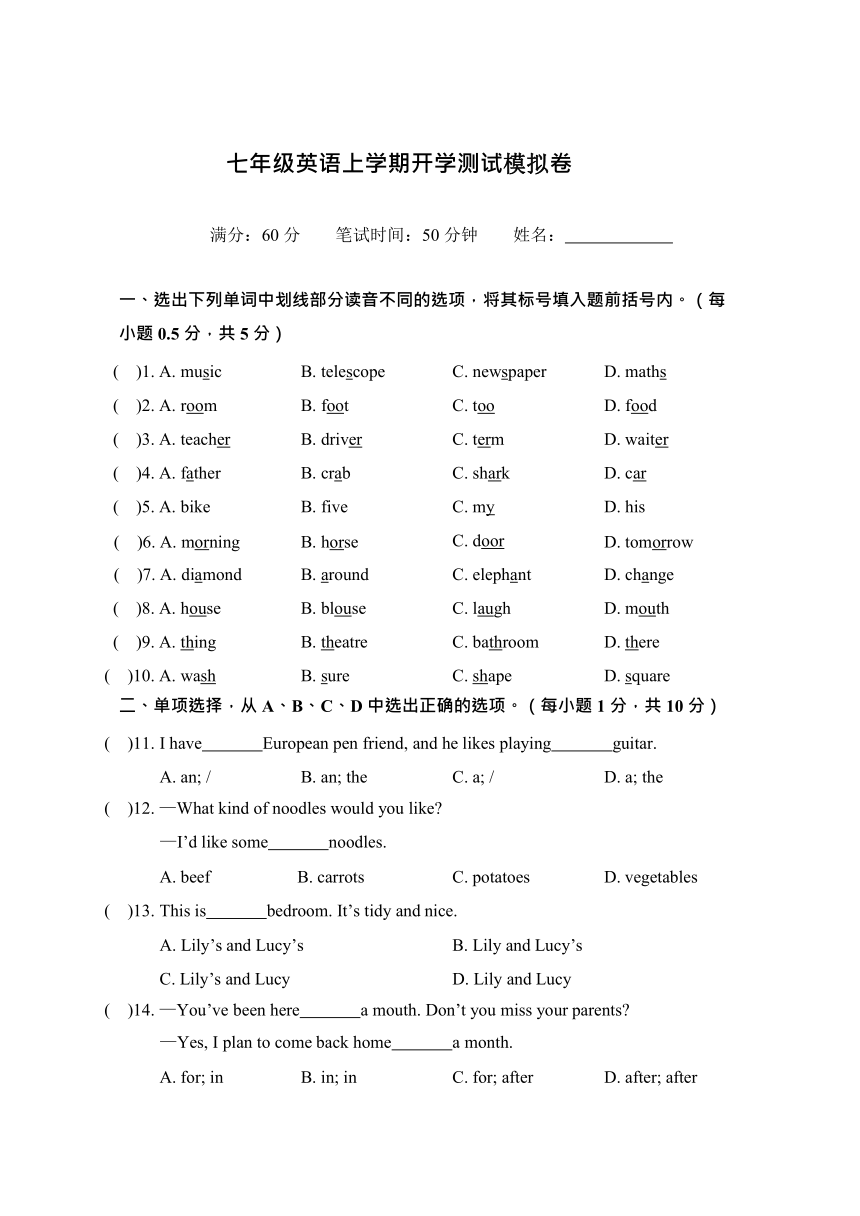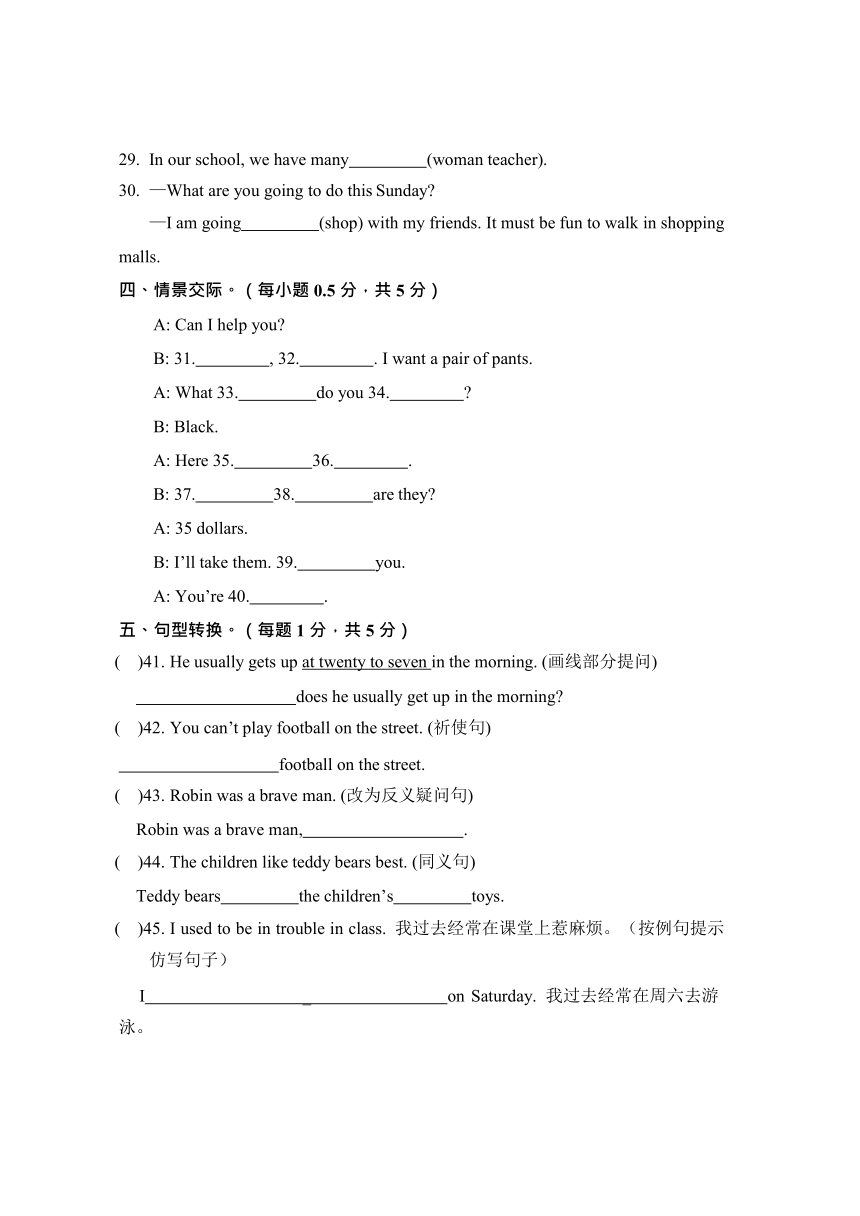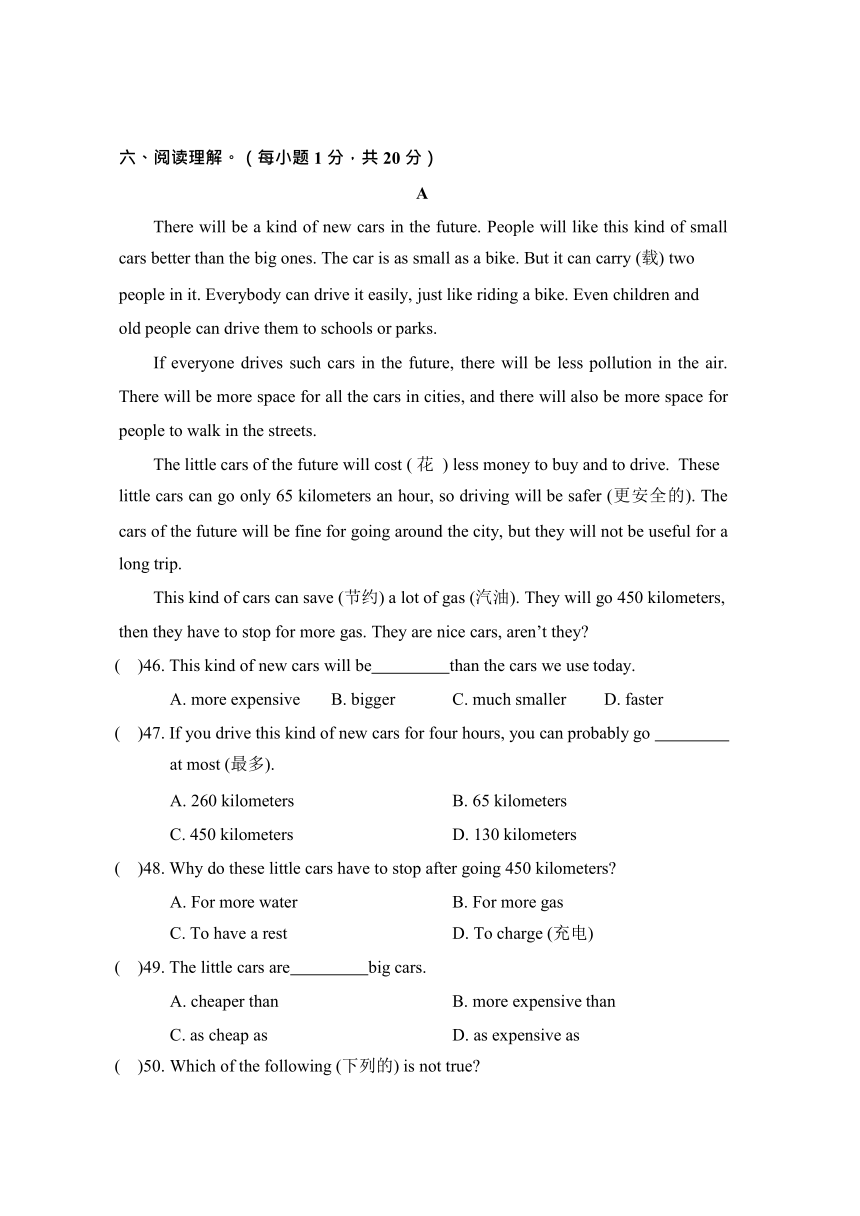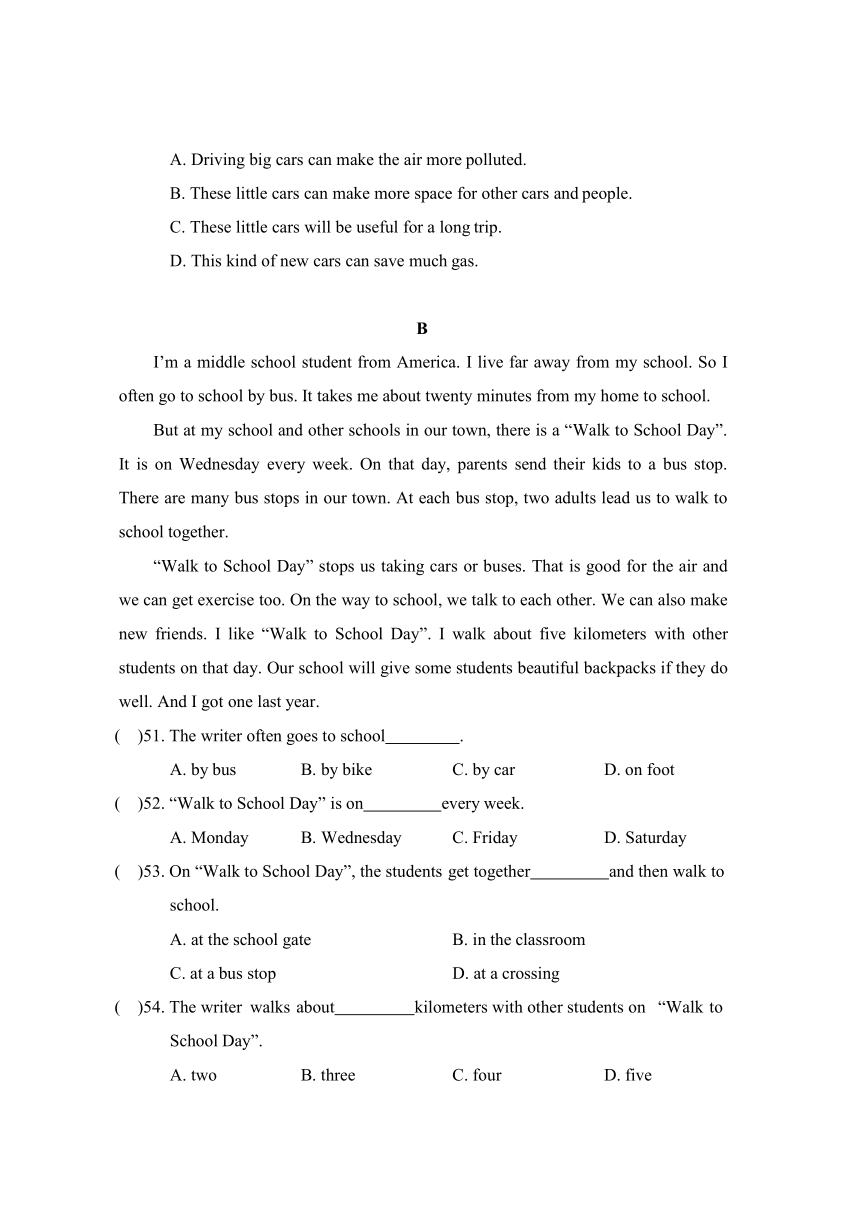吉林省辉南县第四中学2019年秋季第一学期七年级英语开学测试模拟卷(word版,含答案)
文档属性
| 名称 | 吉林省辉南县第四中学2019年秋季第一学期七年级英语开学测试模拟卷(word版,含答案) |

|
|
| 格式 | zip | ||
| 文件大小 | 22.8KB | ||
| 资源类型 | 教案 | ||
| 版本资源 | 人教新目标(Go for it)版 | ||
| 科目 | 英语 | ||
| 更新时间 | 2019-08-19 00:00:00 | ||
图片预览





文档简介
七年级英语上学期开学测试模拟卷
满分:60 分 笔试时间:50 分钟 姓名:
一、选出下列单词中划线部分读音不同的选项,将其标号填入题前括号内。(每小题 0.5 分,共 5 分)
( )1. A. music
B. telescope
C. newspaper
D. maths
( )2. A. room
B. foot
C. too
D. food
( )3. A. teacher
B. driver
C. term
D. waiter
( )4. A. father
B. crab
C. shark
D. car
( )5. A. bike
B. five
C. my
D. his
( )6. A. morning
B. horse
C. door
D. tomorrow
( )7. A. diamond
B. around
C. elephant
D. change
( )8. A. house
B. blouse
C. laugh
D. mouth
( )9. A. thing
B. theatre
C. bathroom
D. there
( )10. A. wash
B. sure
C. shape
D. square
二、单项选择,从 A、B、C、D 中选出正确的选项。(每小题 1 分,共 10 分)
( )11. I have European pen friend, and he likes playing guitar.
A. an; / B. an; the C. a; / D. a; the ( )12. —What kind of noodles would you like?
—I’d like some noodles.
A. beef B. carrots C. potatoes D. vegetables ( )13. This is bedroom. It’s tidy and nice.
A. Lily’s and Lucy’s B. Lily and Lucy’s
C. Lily’s and Lucy D. Lily and Lucy
( )14. —You’ve been here a mouth. Don’t you miss your parents?
—Yes, I plan to come back home a month.
A. for; in B. in; in C. for; after D. after; after
( )15. There some foreign visitors taking a walk in the park.
A. is B. are C. has D. have ( )16. —You are in a hurry. Where are you going?
—To the cinema. Jim for me there!
A. waits B. waited C. is waiting D. was waiting
( )17. The young firemen were so brave that they _ the fire and saved the children in that house.
A. put in B. put on C. put out D. put up ( )18. —Sorry, Miss Liu. I left my workbook at home. Must I hand it in today?
—No, you . You bring it here tomorrow.
A. mustn’t; should B. can’t; must
C. mustn’t; may D. needn’t; can ( )19. —John is not coming tonight.
—But he .
A. promises B. promised C. will promise D. had promised ( )20. Which of the translations is correct?
A. BBC 美国广播公司 B. NBA 中国职业篮球联赛
C. UFO 飞行物 D. CD 激光唱片
三、请根据句意用所给单词的适当形式填空。(每小题 1 分,共 10 分)
He often (have) dinner at home.
Jimmy and his sister (be) here several days ago. They __ (leave) for Beijing yesterday.
Listen! Nancy (sing) an English song now.
While I (cook) the dinner, he (read) the paper.
The boy (not invite) to the party yet, but I think he will be invited soon.
The weather report says it will be (sun) tomorrow.
Mary is one of the (good) students in our school.
I’m not as (careful) as he.
In our school, we have many (woman teacher).
—What are you going to do this Sunday?
—I am going (shop) with my friends. It must be fun to walk in shopping malls.
四、情景交际。(每小题 0.5 分,共 5 分)
A: Can I help you?
B: 31. , 32. . I want a pair of pants. A: What 33. do you 34. ?
B: Black.
A: Here 35. 36. .
B: 37. 38. are they? A: 35 dollars.
B: I’ll take them. 39. you. A: You’re 40. .
五、句型转换。(每题 1 分,共 5 分)
( )41. He usually gets up at twenty to seven in the morning. (画线部分提问)
does he usually get up in the morning? ( )42. You can’t play football on the street. (祈使句)
football on the street.
( )43. Robin was a brave man. (改为反义疑问句) Robin was a brave man, .
( )44. The children like teddy bears best. (同义句) Teddy bears the children’s toys.
( )45. I used to be in trouble in class. 我过去经常在课堂上惹麻烦。(按例句提示仿写句子)
I _ on Saturday. 我过去经常在周六去游泳。
六、阅读理解。(每小题 1 分,共 20 分)
A
There will be a kind of new cars in the future. People will like this kind of small cars better than the big ones. The car is as small as a bike. But it can carry (载) two
people in it. Everybody can drive it easily, just like riding a bike. Even children and old people can drive them to schools or parks.
If everyone drives such cars in the future, there will be less pollution in the air. There will be more space for all the cars in cities, and there will also be more space for people to walk in the streets.
The little cars of the future will cost ( 花 ) less money to buy and to drive. These
little cars can go only 65 kilometers an hour, so driving will be safer (更安全的). The cars of the future will be fine for going around the city, but they will not be useful for a long trip.
This kind of cars can save (节约) a lot of gas (汽油). They will go 450 kilometers,
then they have to stop for more gas. They are nice cars, aren’t they?
( )46. This kind of new cars will be than the cars we use today.
more expensive B. bigger C. much smaller D. faster
( )47. If you drive this kind of new cars for four hours, you can probably go at most (最多).
A. 260 kilometers B. 65 kilometers
C. 450 kilometers D. 130 kilometers
( )48. Why do these little cars have to stop after going 450 kilometers?
A. For more water B. For more gas
C. To have a rest D. To charge (充电) ( )49. The little cars are big cars.
A. cheaper than B. more expensive than
C. as cheap as D. as expensive as ( )50. Which of the following (下列的) is not true?
Driving big cars can make the air more polluted.
These little cars can make more space for other cars and people.
These little cars will be useful for a long trip.
This kind of new cars can save much gas.
B
I’m a middle school student from America. I live far away from my school. So I often go to school by bus. It takes me about twenty minutes from my home to school.
But at my school and other schools in our town, there is a “Walk to School Day”. It is on Wednesday every week. On that day, parents send their kids to a bus stop. There are many bus stops in our town. At each bus stop, two adults lead us to walk to school together.
“Walk to School Day” stops us taking cars or buses. That is good for the air and we can get exercise too. On the way to school, we talk to each other. We can also make new friends. I like “Walk to School Day”. I walk about five kilometers with other students on that day. Our school will give some students beautiful backpacks if they do well. And I got one last year.
( )51. The writer often goes to school .
A. by bus B. by bike C. by car D. on foot ( )52. “Walk to School Day” is on every week.
A. Monday B. Wednesday C. Friday D. Saturday
( )53. On “Walk to School Day”, the students get together and then walk to school.
A. at the school gate B. in the classroom
C. at a bus stop D. at a crossing
( )54. The writer walks about kilometers with other students on “Walk to School Day”.
A. two B. three C. four D. five
( )55. The students can get if they do well on “Walk to School Day”.
A. books B. pens C. backpacks D. erasers
C
It is sunny and warm today. A dog is sleeping. A panda comes to the dog and says, “You are a lazy dog. You don’t do anything every day.”
“What do I need to do?” asks the dog. My owner gives me food to eat. My owner takes me out for a walk. My owner loves me. Ha! I eat, I go out for a walk and I sleep. I don’t have any other things to do.
But don’t you have any ambitions (抱负)?” asks the panda.
“Ambitions? What do I need ambitions to do? I’m just a dog,” says the dog. “What ambitions do you have?”
“I often go to other countries and make friends with people there. So I can show the world that Chinese are friendly,” answers the panda.
“Oh,” says the dog, “maybe I should (应该) do something for others.”
( )56. What is the dog doing in the sunny day?
A. Walking B. Playing games C. Eating D. Sleeping ( )57. 文中划线单词 owner 的中文意思是 “ ”.
A. 主人 B. 老板 C. 长辈 D. 失主
( )58. The dog has only thing(s) to do every day.
A. one B. two C. three D. four ( )59. The panda goes to other countries to show .
A. China has a long history B. China has all kinds of animals
C. China people love animals D. China people are friendly ( )60. The story tells us .
A. We should relax a lot on sunny days B. Everyone should have ambitions
C. Pandas are clever animals D. We should love animals
D
Little Tommy was doing very badly in math. His parents had tried everything--tutors, cards, special learning centers--in short, everything they could think of. Finally they took Tommy to a catholic (天主教的) school.
After the first day, little Tommy came home with a very serious look on his face. He didn’t kiss his mother hello. Instead, he went straight to his room and started studying. Books and papers were spread out all over the room and little Tommy was hard at work. His mother was surprised. She called him down to dinner and as soon as he finished eating, he went back to his room, without a word. In no time he was back hitting the books as hard as before. This went on for some time, day after day while the mother tried to understand what was happening.
Finally, little Tommy brought home his report card. He quietly put it on the table and went up to his room and hit the books. His mom looked at it and to her surprise, little Tommy got an A in math. She could no longer hold her curiosity (好奇心). She
went to his room and asked, “Son, what was it? Was it the nuns (修女)?”
Little Tommy looked at her and shook his head, “No.” “Well then,” she asked again. “WHAT was it?”
Little Tommy looked at her and said, “Well, on the first day of school, when I saw that man nailed (钉) to the plus sign, I knew they weren’t joking.”
( )61. Why did Tommy’s parents send him to a catholic school?
Because he could eat well there.
Because he could earn more about nuns.
Because his parents wanted him to do better in his math.
Because his parents didn’t want him to learn math any more. ( )62. Tommy’s mother felt surprised that his son .
A. was still the same as usual B. ate so much at dinner
C. kissed her hello after school D. worked hard but said little ( )63. “Hitting the books” means “ ” in Chinese.
A. 用功 B. 捶书 C. 发泄 D. 振作
( )64. The last sentence in the passage shows that .
Tommy felt sorry for the mail
Tommy was afraid of being nailed
Tommy didn’t like the plus sign
Tommy liked playing jokes on others
( )65. From the passage, we can infer (推断) that .
teachers should be strict with their students
mistaking (误解) might do good sometimes
a catholic school is much better than other ones
nuns are good at helping children with
七、根据短文内容,用方框中所给词语的适当形式填空。每空一词,每词限用一次。方框中有两个词是多余的。(每题 0.5 分,共 5 分)
Many people have cars in the city. But pollution is a problem because of the 66.
. Nowadays some downtown (市中心) areas around the world don’t have cars. These car-free zones (无车区) are 67. for people, bicycles, and public transportation only.
Eight million people 68. in the center of London and anther two million go to work there every day. The downtown area is very 69. with hundreds of cars, buses, and taxis, but there are 70. a lot of beautiful parks with free music concerts. At lunchtime, many people go there for a rest 71. they get off work.
Parts of Tokyo are always crowded with hundreds of people--but no cars! These modern car-free zones are 72. popular and people like shopping there.
In the past, Bogota was polluted because there 73. lots of cars and
traffic. Now the downtown area is a car-free zone and the air is 74. ! Many people don’t have a car and half a million people take the bus to 75. . There are lots of stores. It’s not expensive.
【参考答案】
1-10 ACCBD DACDD
11-20 DABAB CCDBD
21-30 has; were, left; is singing; am/was cooking, is/was reading; hasn’t been invited; sunny; best; careful; women teachers; shopping
31-40 Yes; please; color; want; you; are; How; much; Thank; welcome
41-45 What time; Don’t play; wasn’t he; are favorite; used to go swimming 46-50 CABAC
51-55 ABCDC
56-60 DACDB
61-65 CDABB
66-75 traffic; areas; live; noisy; also; after; really; were; clean; work
同课章节目录
